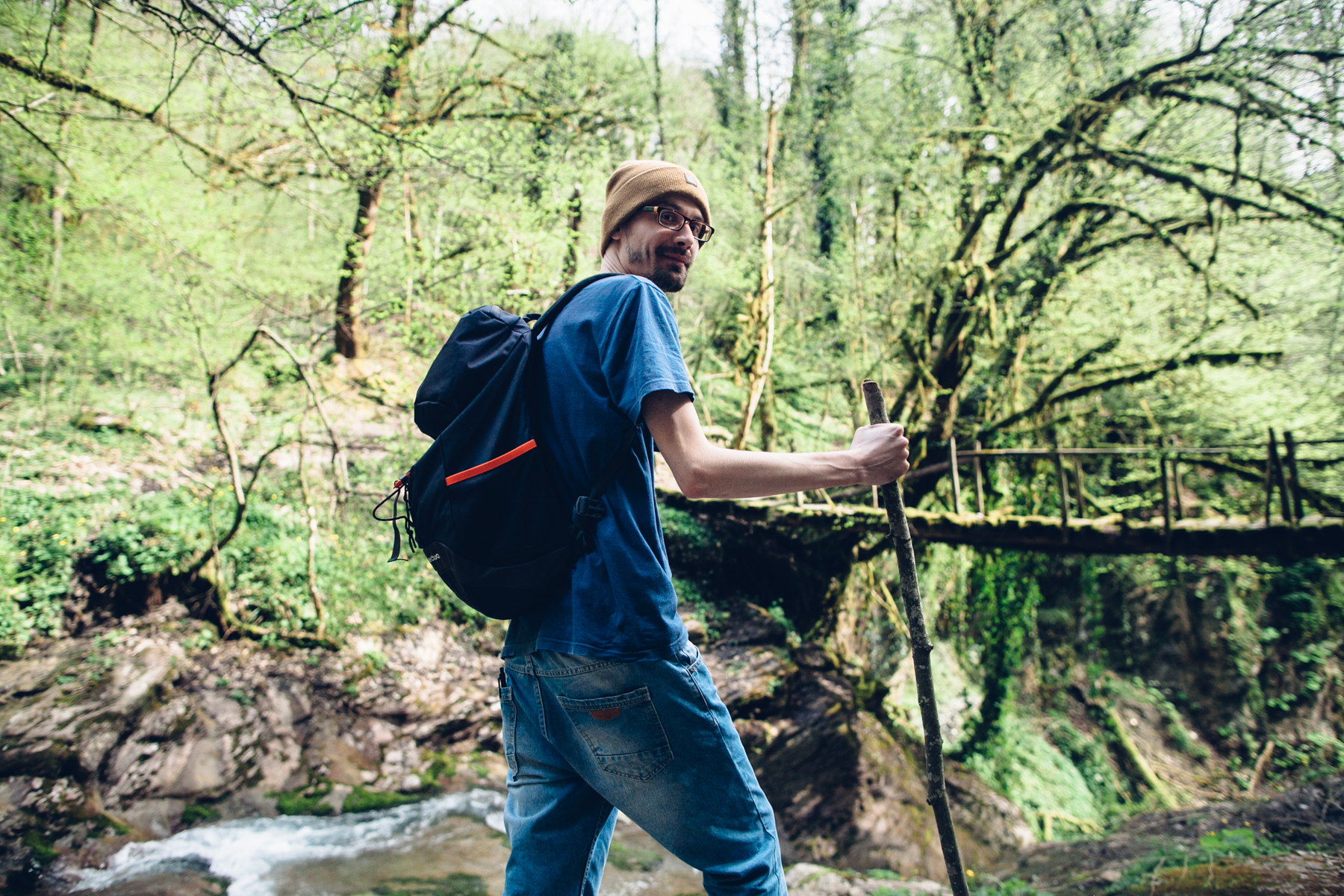Ivan Kuznetsov — outdoor journalist, editor and writer, co-founder of Panoramica creative studio in the Italian Alps.
— This is an interview I gave to the Ridero blog in March 2020, the main self-publishing platform in Russia, which also operates in Europe. We talked about traveling to the cities and outdoors, similarities between creativity and active recreation, the secrets of a perfect travelogue, and a big writing dream.
— Ivan, who is an outdoor editor?
— That’s a good question. It’s like a soccer or music editor, only about the outdoors. Yes, there is such a profession! It just sounds shorter and simpler than “editor specializing in outdoor activities”.
Outdoors include hiking, biking, rock climbing, canoeing, surfing, yachting — and many more. What distinguishes these activities from regular sports, such as running, is that outdoors are not practiced in the city or indoors, but in nature — “out of doors”. They are often quite extreme sports. But they also include fishing, picking mushrooms and berries, horseback riding, even just a picnic outside the city, and other less labor-intensive activities — I call them “passive”.
Outdoors is not just about sports. It is closely connected with ecology and everything that has become fashionable to add the prefix “eco” to: ecotourism (responsible travel to nature and rural areas), sustainable development, simply a healthy and minimalist lifestyle without excessive consumption of anything: things, food, content.
— You used to call yourself a travel editor. What has changed?
— A travel editor is someone who writes about travel in general. In my seventh year in journalism, I suddenly realized that city sights, cheap airline tickets, and the like are no longer of interest to me. Moreover, two thirds of my interviews and other publications — I counted them on purpose — were already on these topics, not about traveling.
This year I got brave and renamed myself as an outdoor editor. What you name the boat, that’s how it sails.
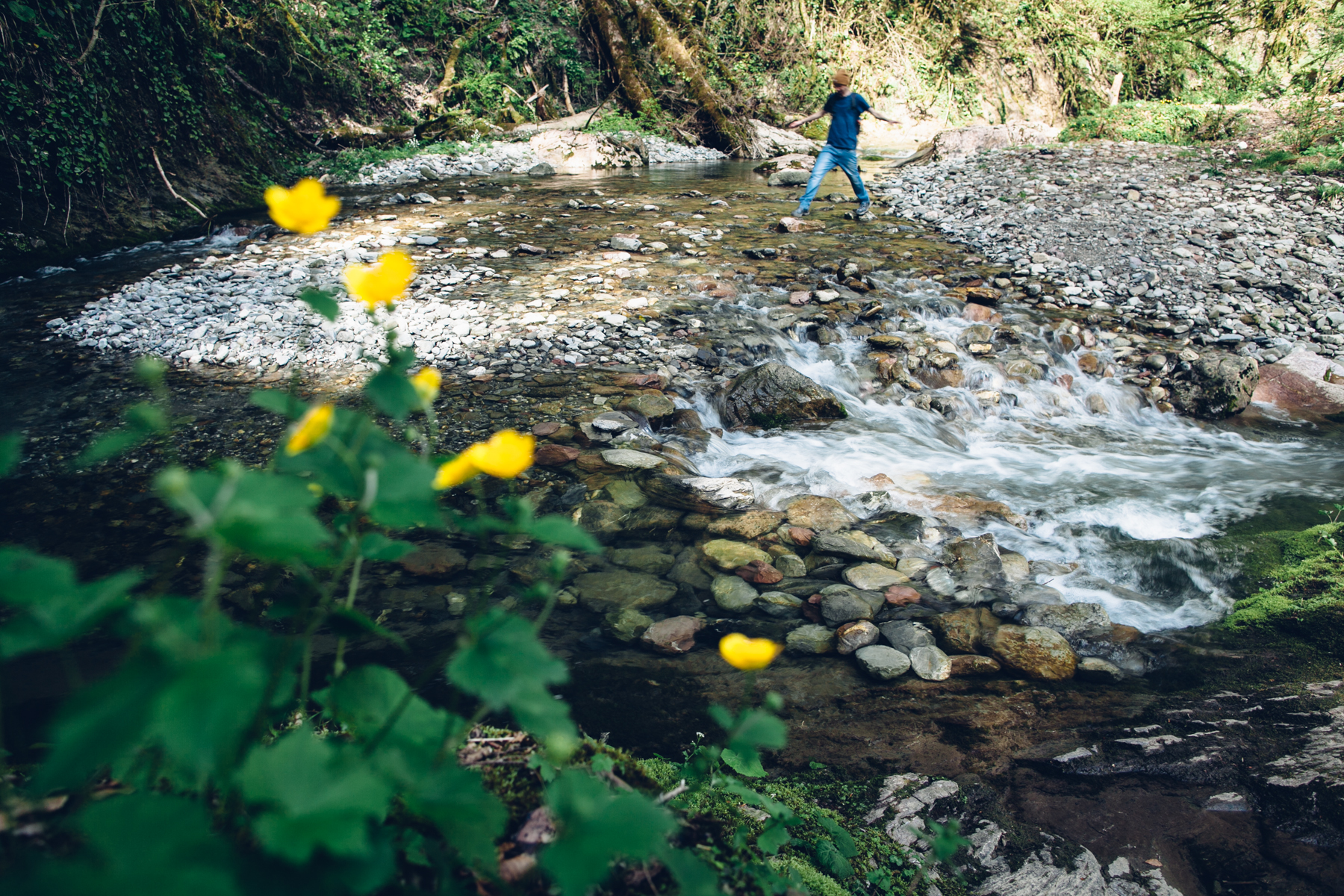
— Why is traveling to nature better than cities?
— I used to love cities too — until I moved from Nizhny Novgorod, the city 500 kilometers from Moscow where I grew up, to St. Petersburg, where nature is closer. In Nizhny, which is located on the plain, there is nowhere to go except the Volga and Oka rivers embankments. Plus the northern nature is more beautiful. In St. Petersburg I started to go out of town to villages in the Petersburg region and neighboring Karelia.
Such journeys are deeper and more intense than in cities, they are more life-changing. Also because most of us live in big cities like Moscow, St. Petersburg, or Yekaterinburg in Ural Mounains, where your service originates, getting out into nature is still an event. For some, even in St. Petersburg and the Urals.
I’m always surprised: despite all these new opportunities and services for traveling in the format of outdoor activities and ecotourism like Airbnb or BlaBlaCar (we’re talking about communicating with locals) that we have, most people still travel passively through cities, and even in the format of all-inclusive package tours. These people are very far from active recreation.
You could say, as an editor and journalist (and these are socially important professions), I am genuinely in favor of more people engaging in outdoor activities.
— I found an interesting thought from you that outdoor activities/sports and creativity are the same thing. Why?
— I realized this when I worked my first year in ecotourism in the Dolomites and even came up with my own definition of creativity in a broad sense — it’s the ability to invent yourself while overcoming all sorts of challenges. Just like on a mountain hike — carrying a heavy backpack, knowing that there is a week’s journey ahead. Enduring the heat and thirst. To navigate unfamiliar terrain. To cope with the feeling of loneliness or, on the contrary, to help group mates.
Who goes hiking knows that sometimes you are literally born again, discover hidden inner reserves and new sides of character, when it seems that there is no more strength to go, but they are definitely there. And there you are, reborn — like after a good bath or sauna. And I thought: why is it so in hiking, but not in ordinary life? It’s so great to be stronger than you are, to be your true self.
Why are we more real on hikes and not in cities?!
It’s easy to draw parallels between life in the city and mountain hiking in general. For example, a winding and sometimes thorny path is very similar to career or creative path. Where will it take you? Are you on the right path at all or are you lost? Walking in the mountains, you look at life from the outside. Life’s problems seem smaller than they really are. And in general, compared to the mountains or endless forests — everything is smaller.
Most importantly, when traveling to nature in the format of active recreation and ecotourism, it is simply impossible not to think about life creatively. It is so beautiful around you that you want to become an artist and start painting landscapes. Or to make not just beautiful photos, but very beautiful ones — the ones that all your friends will like. Poems and prose pop into your head. You start whistling tunes to the birdsong. You don’t need Apple Music with its millions of songs. I deleted it, by the way, as well as all my music archives on my iPod.
You want to share the experience of any good travel, and in the format of outdoors — even more than stories about urban travel. After hiking, I want to do something more creative — something that is more necessary and useful to people.
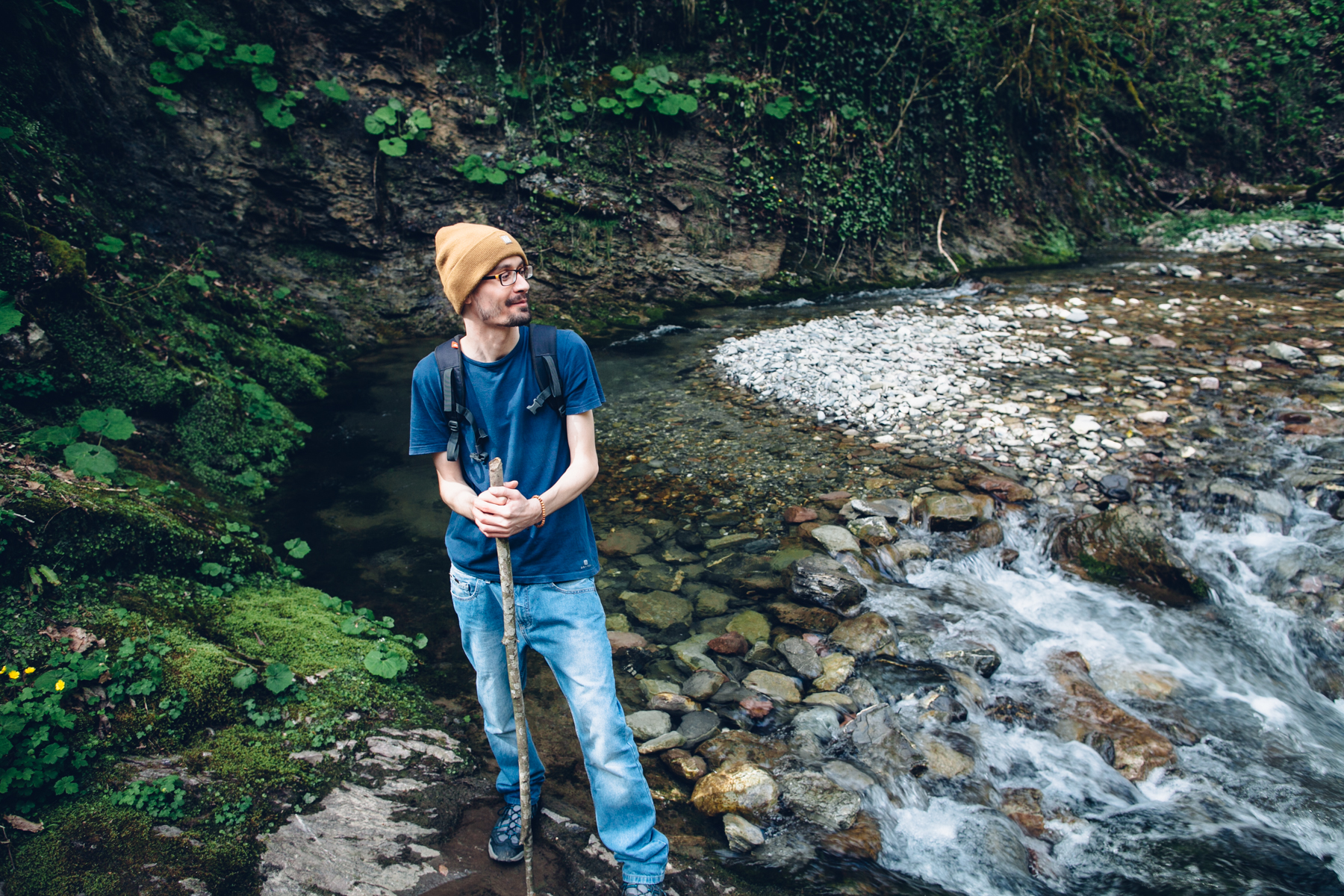
— Like what?
— In my hikes, that I’m organizing in the Dolomites, there were cases when people changed their profession and way of life. For example, one girl worked in customer service at a bank and became a physiotherapist, although during the hike she complained that it was difficult for her to walk in the mountains and to hell with them. Many people move from big cities to smaller communities and closer to nature. Before becoming an editor, I also worked at a factory (in the advertising and marketing department) for seven years and lived in St. Petersburg. But after Italy, I realized that I couldn’t do it anymore.
I’m not saying that working in banking or sales and living in a megalopolis is bad. Someone is an excellent salesman, and someone is a bank employee. And it’s enough for them to get out into the woods a few times a year. Or they like fishing and baths, not hiking. The point is to do your own thing and live where you like.
The point of life, in general, is to invent yourself, not to try on one of the ready-made societal roles, unless you really like it. That’s it.
— Let’s move on to books. How do you write the perfect travelogue? What is your favorite book in this genre?
— Just like any other perfect book — no one knows the formula.
Taking into account the global and already Russian trend for ecotourism, I would do the following: I would go to live in some village for six months or a year and walk around it through mountains and forests instead of changing countries on my way around the world, communicate more closely with ten locals instead of looking for reasons to meet hundreds. And so on. Whether abroad or in your native country, it is far from necessary to go for an interesting story.
While you live in the village, every day keep a diary, travel notes or write letters to friends and family. But it’s better not to blog — more on that next. Then you can make a book out of them — it’s easier than writing it from scratch.
When the book is ready, find a good editor who will look at the book from the outside and give valuable advice. Everything seems interesting when traveling, but not all of your experiences will be interesting and relevant to the reader.
It’s important to be able to edit and cut away the unnecessary.
I still haven’t ruled out the structure of my book, even though I published it six years ago. Ridero allows me to do that. But it’s better not to do that — it’s better to write a new one. I just didn’t have an editor.
Finally, the layout. I wouldn’t try to put hundreds of photos into a book. 10 is enough. To get the reader’s imagination going. That’s what books are written for.
Look for yourself: all the major travelogues that are associated with the genre are like this. I won’t be original here: of course, it’s In Patagonia and Song Lines by Bruce Chatwin, the first travelogues author. After him, travel books began to be called that, although even the Greek philosophers were fond of this genre.
By the way, Chatwin has only two travel books, not dozens, as, for example, Paul Theroux — another famous author, who is boring to read, in my opinion, and I like Chatwin’s book about Australia better than Patagonia.
As for a favorite book, I once asked the same question myself in an interview with my favorite nomadic author, Mariusz Wilk. He is a Polish writer who lived for 20 years in the Russian north and wrote six books about it. Two of his books — “By the the Reindeer Trails” and “The House Above Onego” — are my favorites. Also because I’m from these parts of the world myself.
And Mariusz answered that his favorite book is “The Way of the World” by the French author Nicolas Bouvier.
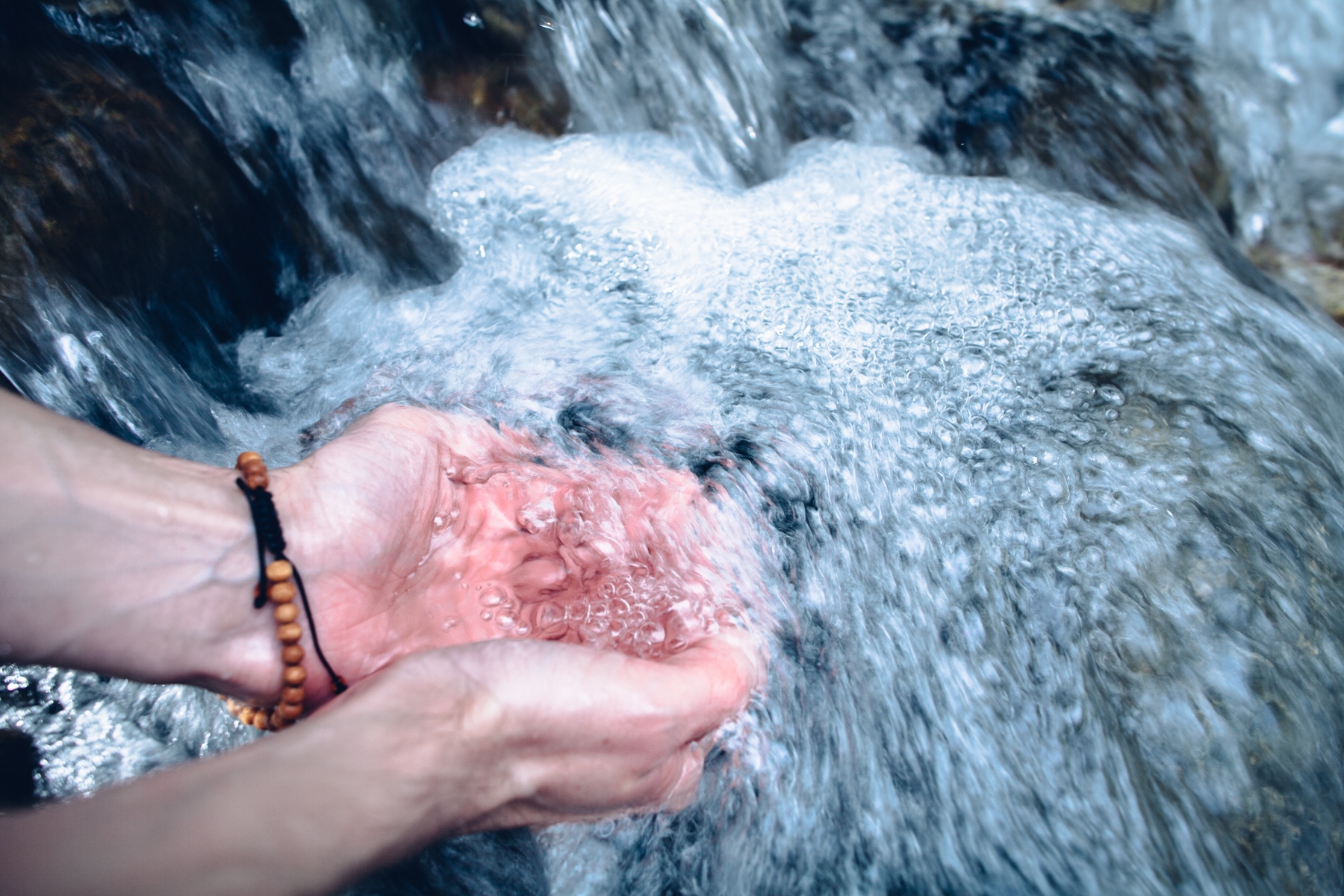
— How can your own book be useful to a professional traveler and guide?
— If we talk about popularity, earnings on books, and writing as a profession, then today it is more useful to keep a blog on Instagram or even better — a channel on YouTube. And sell advertising there. Or to organize your own travels, as many travel bloggers do — to earn in other ways.
But books are also useful. It’s just that today they have turned into some kind of status thing. Writing and publishing books are still cool, prestigious, and great. Why?
Not everyone writes books — it shows that you probably have a good knowledge on the subject — and therefore you are an expert (another popular word today).
Being not just a blogger, of which there are hundreds, but a book author means you stand out from the crowd of others like you. Writing a travel book is easier than others. But there are a lot of travel authors too, and there is more competition for readers.
When it comes to travel guides, a book also helps you gather all the information on something in one place. Reading books is more convenient than browsing blogs — especially on social media, which are about “today”. Books can be reread.
For tour guides, I would recommend writing author’s guides. They are also in trend today. Surprisingly, among Russian-speaking guides, almost no one does this. But only about those places where they live or have lived for at least a year as a local (a year to see the whole cycle of nature). Guides “both here and there”, I don’t trust very much. For me, the best guides are locals. And that goes for ecotourism too — that way you get to know and support local communities better, rather than sponsoring companies and individuals who make money off of them rather than helping them develop.
— And if it’s not for fame and money. What else is writing a book for?
— Writing — better than anything else — helps you make sense of your own life experiences.
As Mariusz Wilk says, when you write, you travel the same paths of life for the second time. This journey is even more meaningful than a literal one because you look at yourself from the outside and notice what escaped your attention at a particular moment. Writing is also a journey.
But there’s the same difference: blogs are written quickly and momentarily. Books are thoughtful and forever. I’m all for thoughtfulness.
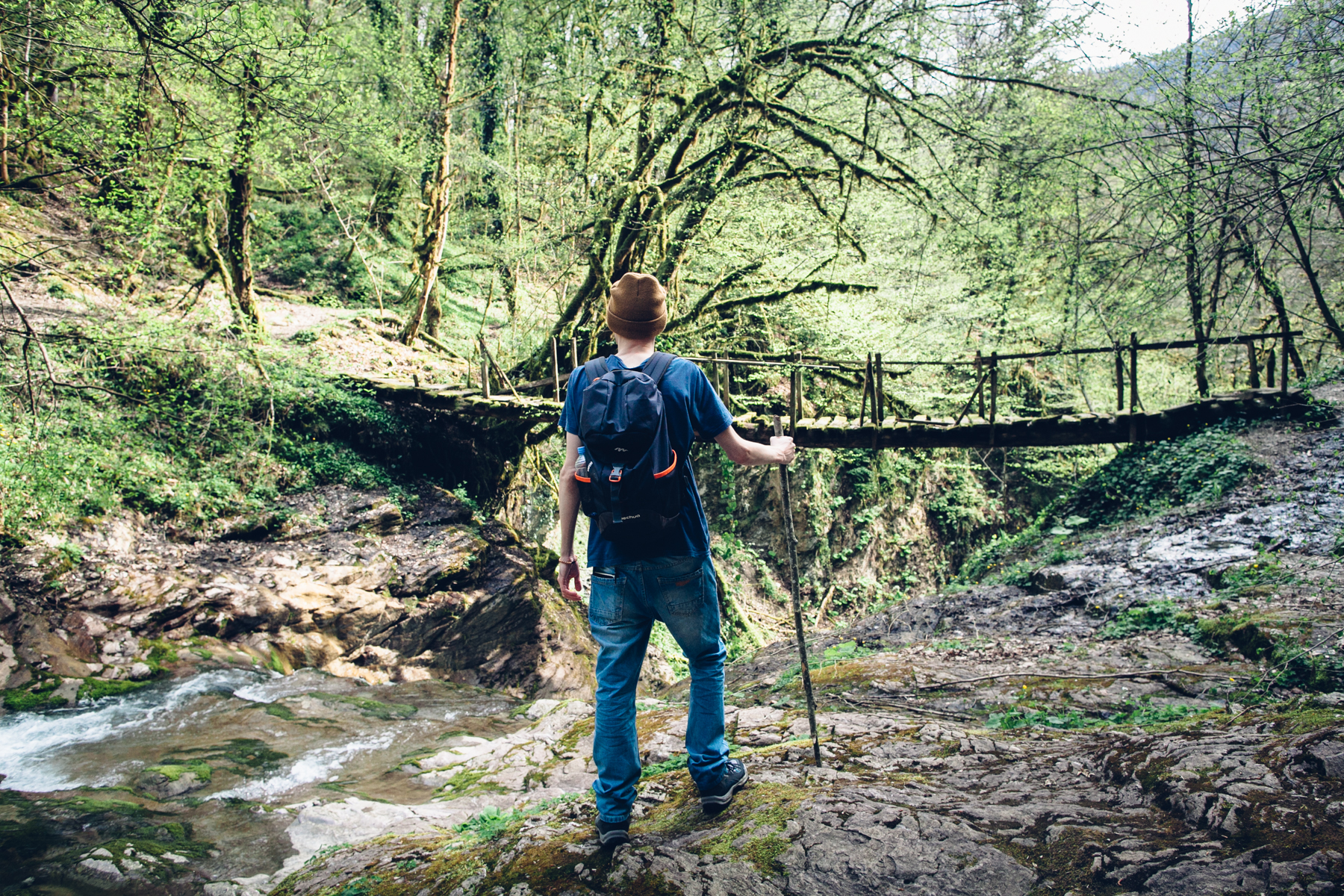
— How did your books come about?
— I wrote my first book, “The Mountain Keeper”, using the above method — about my time working (and still working) in the Dolomites. Again: it was such a cool experience that I just couldn’t help but put it on paper and share it with others.
My second book is the first Russian-language collection of interviews with famous travelers, “I’m Arriving”. There are 40 interviews and 55 characters in the book, including myself. I purposefully recorded them for two years to show that traveling is not literally going somewhere, it can be done in hundreds of different ways: from volunteering in the Alps to doing science, creativity, and sports.
I also wrote the book because my work as a guide in the Dolomites is on a volunteer basis, it was originally a volunteer project that I just decided to continue. Journalism and editing is what I actually do for a living every day. I didn’t become a writer or a professional guide, but I became an editor.
— What will the next book be about?
— The next two books are guides with ready-to-go hiking itineraries in the Dolomites and wild Finland, which is my second favorite country. I’ve written more than 30 articles about each region over six years and now I’ve finally decided to collect them in one place.
But in general, I have about 10 almost ready books of journalistic and not only texts: other collections of interviews (I have recorded more than 150 of them in different sections for different editions) and articles. I can’t get my hands on Ridero, even though it’s very convenient.
I’ll soon publish a separate essay “What is traveling” — also based on the example of Finland. Everyone asks this question. I think that on my first trip to Helsinki, I found the answer to it — I want to share my discovery with the world.
I dream of writing a Big Book one day. I’ve known what it was gonna be about for a long time, but I don’t know what it will be.
And that it would become a bestseller and that it would be translated into many languages. I have wanted to do that since I was about seven years old when I learned to read and write.
But the more I write, the more I realize that a book can be one page or one letter at all. At seven, I wanted to spend my life behind a writer’s desk and traveling the world giving presentations, but I’m definitely not going to spend years doing that now. “Outside the door” is an even more amazing world than on paper, and you can travel in much simpler and more interesting ways than writer’s tours.
Being my true self every day is more important than dreaming of a life’s calling.
The original publication on the Ridero blog.
Photos: hiking to Azhek waterfalls along the Sochi River, Black Sea, Russia, with Maxim Gololobov, a local nature photographer, who gave me a test tour for my main client in that time, HelloGuide at Skolkovo Startups Academy
Subscribe to the monthly Backstory newsletter on creativity — get one of our ebooks.
Follow @pnrmcstudio on social networks.
Go to Bookstore, Photography, Practices, Creative hikes or to Studio page.
